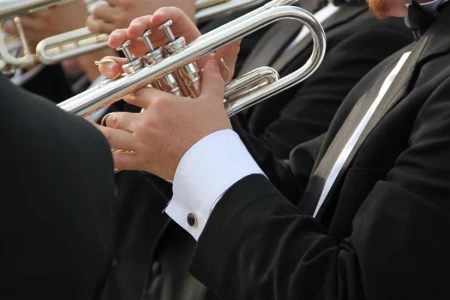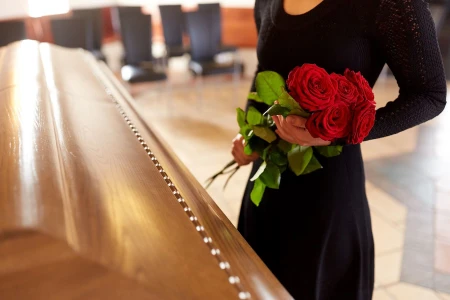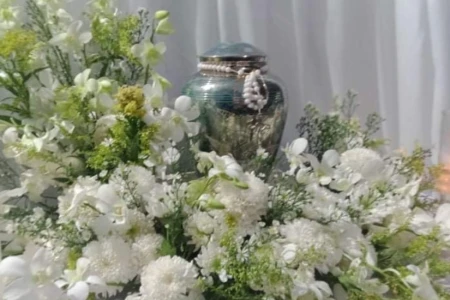Table of Contents
In the funeral industry, elegance, tact, and proper etiquette are absolutely crucial. Preparing and conducting a funeral ceremony with due seriousness, discretion, and respect for the feelings of the deceased's family builds the professionalism of the funeral home and earns the trust of clients. A well-conducted funeral requires a combination of empathy with high personal culture and professionalism, which influences the reception of the entire event. Below, I will discuss the principles that have become pillars of my funeral service practice over a decade of experience.
Etiquette in Communication with the Deceased's Family
Communication with the family of the deceased is the first and most important step in working with the client, which should be carried out with the utmost delicacy and understanding. This is the moment when a grieving family seeks support and a sense of security.
How to Conduct Conversations with the Family of the Deceased – Tone and Speech Style
The foundation is the tone of voice. It should be calm, warm, and filled with compassion. It's important to avoid rigid, formal language but also not to be overly familiar. Communication should be respectful and adapted to the emotions of the person you're speaking to.
What to Avoid in Conversations to Show Respect and Understanding
Avoid using phrases that might sound too mechanical or emotionless, such as “I understand what you are going through.” Instead, focus on active listening, ask for details regarding the ceremony, and show that you understand their needs.
The Role of Empathy and Active Listening
Empathy in communication is a key element. It's important to show understanding for the difficult moments the family is going through. Sometimes silence and time for reflection can be more helpful than words.
Nonverbal Language – Posture, Gestures, Facial Expressions
Body language plays a huge role. Maintain an appropriate posture, avoiding overly close physical contact but also not turning away from the person you're speaking with. Your facial expression should convey sympathy, but without exaggeration. A warm, sincere smile can express more than words.

Organizing a Funeral Ceremony According to Etiquette
Organizing a funeral ceremony is the art of combining elegance with delicacy. It's a moment when every detail – from the decorations to the music – is of great significance to the family of the deceased and their memories of that moment.
Choosing the Right Setting – How to Match the Ceremony's Character to the Family's Wishes and the Deceased's Personality
The first step is a conversation with the family about their expectations. The ceremony should reflect the personality of the deceased, their passions, and life. For example, if the deceased was a person who loved classical music, it's worth suggesting an appropriate musical accompaniment. Elegant decor doesn't mean excess but rather subtlety and fitting the family's needs.
The Attire of Funeral Home Staff – Standards of Elegance and Discretion
The funeral home's staff attire should be professional but not attention-grabbing. Black suits, white shirts, modest accessories, and good hygiene are absolutely essential. The staff must appear neat and maintain the seriousness of the situation.
The Importance of Subtle Decorations and Flowers – Elegance Without Excess
Flowers and decorations should be muted and elegant. Classic arrangements that symbolize respect and honor for the deceased are preferable. It's important to avoid overly extravagant arrangements that might disturb the calm and reflective atmosphere.
Matching Music and Speeches to the Occasion
Music is a key element of a funeral ceremony. Well-chosen music highlights the seriousness and ritual of the farewell. It’s a good idea to ask the family if they have any specific songs that were meaningful to the deceased, but always ensure that the choice of music fits the character of the ceremony.
Staff Behavior and Work Style During the Ceremony
The funeral home's staff plays a key role during the ceremony. Their behavior, movements, and interactions with the ceremony participants affect the overall atmosphere.
How Should Staff Behave During the Funeral Ceremony?
The foundation is discretion and professionalism. Staff should work according to the agreed plan, not drawing attention to themselves but remaining ready to offer support to the family. Every action and decision should be planned and adapted to the needs of the situation.
Maintaining Discretion and Avoiding Drawing Attention to Oneself
During the ceremony, staff should maintain full seriousness and discretion. Avoid conversations, jokes, or loud noises. The staff should not focus attention on themselves but rather allow the family to concentrate on the final farewell.
Offering Support to the Family in a Subtle and Invisible Way
If the family needs help, staff should provide it in an unobtrusive but effective manner. Offering tissues, assisting with moving to the place, or allowing a moment of rest are small gestures that, however, hold great significance.
Examples of Inappropriate Behavior to Avoid
Excessive familiarity, inappropriate jokes, loud conversations, or displaying nervousness should be avoided. It’s important that funeral home staff maintain calm and respect in every situation.
The Attire and Presentation of Funeral Home Staff
The attire of funeral home staff should adhere to the principles of elegance but also be modest. Dress code is a key element that builds trust in the company and expresses respect for the deceased's family.
Dress Code During Funerals – Key Clothing and Hygiene Guidelines
Staff should wear dark, muted clothing – typically black suits or dresses. The clothing must be clean, well-chosen, and appropriate for the situation. Personal hygiene should be well-maintained to avoid any discomfort.
The Importance of Details – Accessories, Jewelry, and Makeup
Details, such as modest accessories (e.g., classic watches or jewelry), as well as subtle makeup and hairstyles, emphasize the professionalism of the staff but should never draw attention.
How Attire Affects the Perception of Professionalism by the Family and Mourners
Elegant but subtle attire reflects the seriousness and professionalism of the funeral home. It is a way for the family to feel respected and comfortable.
Adapting Services to Different Traditions and Beliefs
Every family has its own traditions, religion, and expectations associated with the funeral. The funeral home staff must be prepared to respect these differences and adapt the ceremony accordingly.
Religious Diversity and Ceremonies – How to Show Respect and Understanding
When organizing funerals, it’s important to take into account the family’s faith and religious customs. Each religion has its specific rituals, such as prayers, the method of transporting the body, or preparing the ceremony.
Specific Rules and Customs for Different Cultures
Culture also influences the course of the ceremony. It's important to ensure that each ceremony is adapted to the traditions and customs of the ethnic or national group, minimizing the risk of misunderstandings.
Summary
Elegance and tact in funeral services are key elements of a funeral home's professional work. Attention to every detail, respect for the family, and the ability to adapt the ceremony to individual needs help create an atmosphere of peace and respect that accompanies people in difficult times.
FAQ: Elegance and Etiquette in Funeral Services
1. Why are etiquette and tact so important in the funeral industry?
Etiquette and tact are crucial in the funeral industry because they help create an atmosphere of respect and sympathy, which is essential in difficult moments such as funerals. Proper staff behavior and communication build trust in the funeral home and provide the support the family needs during this delicate time.
2. What are the most important communication principles with the deceased's family?
The most important communication principles include empathy, delicacy, and active listening. Avoid mechanical phrases like "I understand what you're going through" and focus on carefully listening to the family’s needs, asking questions to understand their expectations, and expressing sincere sympathy.
3. What traits should funeral home staff exhibit?
Funeral home staff should demonstrate discretion, professionalism, empathy, and the ability to adapt to various situations. It's important that staff maintain proper posture and avoid drawing attention to themselves during the ceremony, focusing instead on meeting the needs of the family.
4. What should the funeral home staff’s attire include?
Staff attire should be elegant but subtle. Black suits, modest accessories, clean and well-chosen clothing are essential. The attire must be appropriate for the seriousness of the situation, maintaining professionalism without drawing attention. Additionally, staff should pay attention to personal hygiene and neatness.
5. How to ensure the right atmosphere during a funeral ceremony?
The atmosphere of the ceremony should be respectful and calm. Funeral home staff should focus on subtle decorations, appropriate music, and discreet assistance in organizing the ceremony. It’s important for the family to concentrate on their emotions, while the staff remains unobtrusive.
6. What traditions and beliefs should be considered when organizing a funeral?
Every family may have its own traditions, religion, and customs related to funerals. It’s essential for funeral home staff to adapt the ceremony to these traditions and customs. Depending on the family’s faith, various elements of the ceremony may vary, such as religious rituals or music.
7. What are the most important behavior guidelines during a funeral ceremony?
During a funeral ceremony, staff should maintain full discretion and seriousness, avoid conversations and noise, and not draw attention to themselves. Staff should help the family subtly, offering assistance when needed without overly engaging in the ceremony’s proceedings.
8. Are there specific guidelines for handling unexpected situations?
Yes, funeral home staff should remain calm and professional in the face of unexpected situations. They must avoid panic and follow procedures to resolve problems quickly while maintaining respect for the family and other ceremony participants.
9. What are the benefits of following etiquette in the funeral industry?
Following etiquette in the funeral industry helps build trust in the funeral home, increases professionalism, and enhances the family's comfort. A well-maintained, respectful approach to each ceremony contributes to long-term reputation and positive recommendations.
10. What actions should be taken after the funeral ceremony ends?
After the ceremony, it's worth maintaining brief contact with the family, offering additional support, such as helping with formalities or providing post-funeral advice. This is a good way to show respect and support after the ceremony, as well as build long-term relationships with the family.




